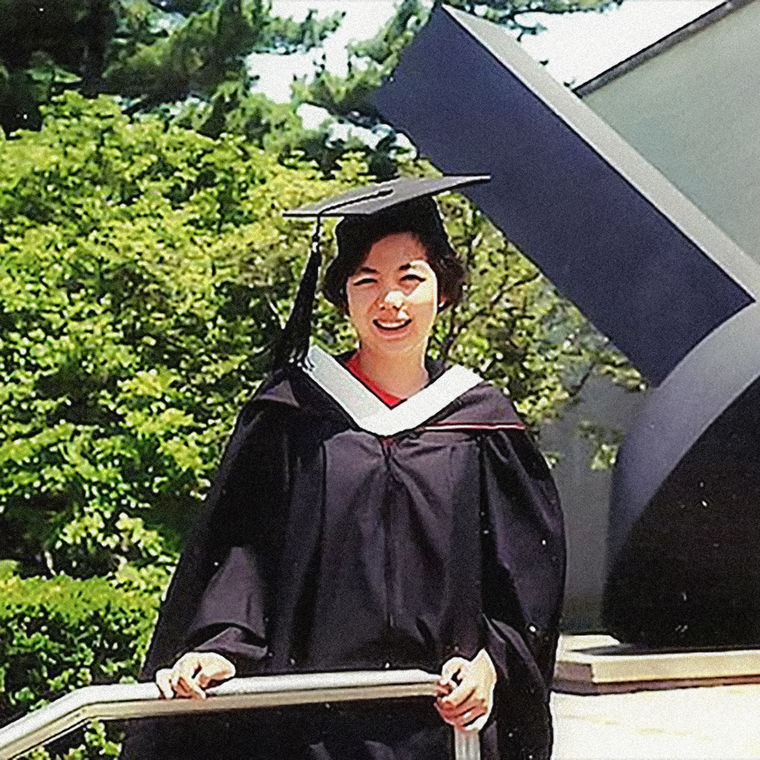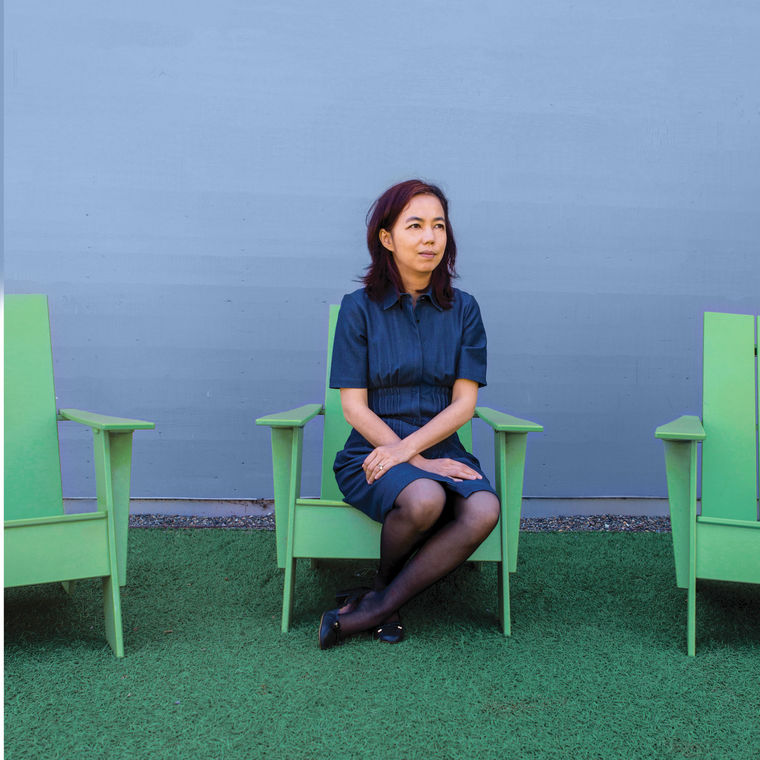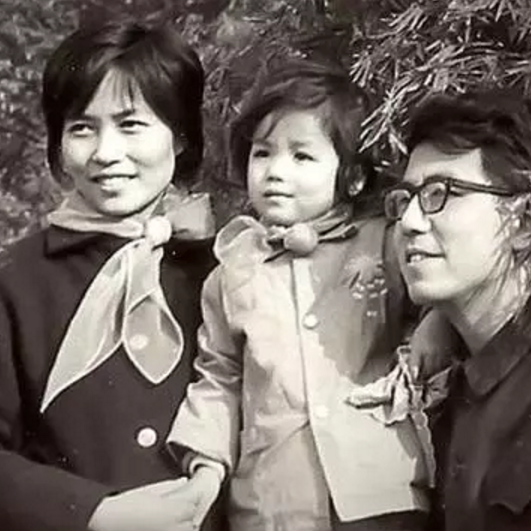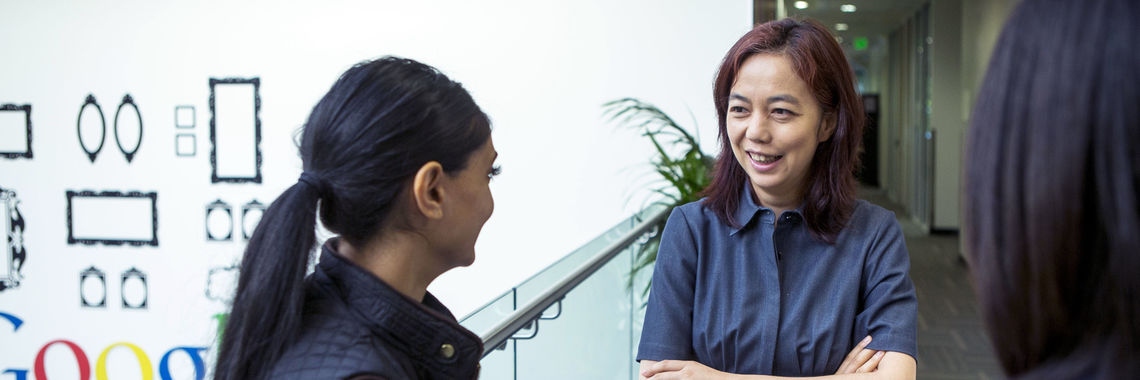P.D. Soros Fellowship for New Americans
If you are an applicant and need to sign into the online application, you can find the link on the "Apply" page of our website: Apply Page.
If you are a fellow looking to login, please note that we are currently updating our backend system for managing Fellow data. In the meantime, to update your information for the Fellowship, please send updates to Nikka Landau at nlandau@pdsoros.org.
Fei-Fei Li (1999) : Founding Mother of the Artificial Intelligence Revolution
-

Fei-Fei graduated from Princeton in 1999 and went on to pursue her PhD at Caltech.
It might come as a surprise that Fei-Fei Li’s favorite class in high school was not math or physics, but instead United States history. She is, after all, one of the world’s leading artificial intelligence scientists, and she loved science from an early age. But when Fei-Fei first arrived in the US with her parents as a sixteen-year-old Chinese immigrant, she was fascinated by the American colonies, the Founding Fathers, and the Constitution.
These days, in the world of computer science and machine learning, Fei-Fei is doing something not all that dissimilar from what her favorite Founding Father, Benjamin Franklin, did. Along with her peers in Silicon Valley, Fei-Fei is building technology that reshapes the ways humans live on this planet. She calls it the fourth Industrial Revolution.
Fei-Fei, an associate professor of computer science at Stanford University, has been at the forefront of artificial intelligence since the early 2000s, when she was a computer science PhD student at the California Institute of Technology and a Paul & Daisy Soros Fellow. At the time, she was beginning her groundbreaking work teaching computers how to see and understand images. Fei-Fei’s team developed algorithms that allowed computers to identify objects in images. But instead of focusing on strengthening the algorithms to improve computer capabilities, she turned to big data to provide the computers with the high-quality information they needed to learn to see. This initiative became ImageNet, a project that Fei-Fei launched with Princeton University Professor Kai Li in 2007.
The ImageNet team downloaded nearly one billion images from the internet and, working with crowdsourcing technology, utilized the help of 48,940 people to label each image with the correct language necessary for a computer to be able to understand what’s in it. Thanks to this work, computers can not only identify objects in an image, but they can then look for patterns across the images. For example, computers scanned Google Street View images from hundreds of US cities and identified every single car by make and year. They were then able to crossreference that data with geographic information to understand how the price of cars correlated with societal information like voting behavior and crime rates.
I’m very thankful that I can see the world from different angles. It gives me a lot of empathetic understanding of our commonalities and how to appreciate our differences. I do think that America is built on immigrants and the fundamental values of immigrants—hard work, respect, freedom. I am happy to be an immigrant.
-

As a mother of two, a professor, a nonprofit leader, and a chief scientist at Google, Fei-Fei never has a dull moment.
Photo Credit: Saul Bromberger & Sandra Hoover Photography
In her newest professional role as the chief scientist of artificial intelligence and machine learning at Google Cloud, Fei-Fei is focused on delivering strong cloud computing systems to every industry across the globe in an effort to democratize the technology and improve it. “They might not realize it, but as far as I’m concerned, almost every field is going through a transformation because of data, machine learning, and the interconnected world we live in,” Fei-Fei explained over a Google Hangout in June. “It’s incredibly inspiring, and it really does inspire me to think a lot about how to deliver that technology to people in the way that they need it.”
Fei-Fei’s machine learning and research team at Google Cloud has doubled in size since her arrival. They are working with companies like eBay and Lush to improve data security, decrease wait times, and improve the consumer experience. Recently, they helped HSBC reduce the time it took to generate a finance liquidity report from six hours to six minutes.
“The impact of technology has many facades. It can help to increase productivity, and reduce inefficiency and error, and improve quality of life, but it also changes the landscape of the economy, the labor market, and the environment,” she continued. “We need to be very thoughtful and invest in these fundamental technologies and opportunities, so that’s what brought me to Google Cloud.”
One way that Fei-Fei is investing in the field outside her work at Stanford and Google Cloud is through her nonprofit, AI4ALL, which exposes underrepresented high school students to the field of artificial intelligence. “Diversity and inclusion is a huge problem in tech, it’s a huge problem in Silicon Valley, it’s a huge problem in computer science, and it’s a huge problem in AI,” she noted. “The technology we create for society needs to reflect the values of the society as a whole. In order to do that, we need technologists that can represent who we are as humans. I think that the education of a diverse next generation of technologists and thought leaders is critical to ensure the benevolence of AI as a technology.”
Fei-Fei’s commitment to all sides of the field of artificial intelligence makes her the remarkable leader that she is. Her decisions will shape the way we interact with technology and the way it improves our lives.
-

Fei-Fei and her parents in Chengdu, China. The family immigrated to the US when Fei-Fei was a teenager.
ON WHAT SHE WAS LIKE AS A CHILD IN CHENGDU, CHINA
I think I was a bit of an outlier. I liked different things. I read a lot of books. I was very interested in reading all kinds of science fiction and science, all the way through to lots and lots of European literature. Much of my childhood was defined by massive amounts of book reading. That really helped me to have an independent mind. That’s why in school I wasn’t a model student. Teachers would not say, “Let’s all have Fei-Fei as a role model.” Definitely not.
ON HER FIRST IMPRESSIONS OF THE US
It was very different. First of all, China is very populated. I grew up in a city, so there were a lot of people, and I landed in a suburb of New Jersey, and I remember it felt very empty. There was hot water coming out of faucets—that was pretty amazing. It was completely different. I didn’t speak much of the language.
ON HOW SHE LEARNED ENGLISH
Dictionaries. American high schools have these enormous books; they are like huge bricks. For me, it was like having all of these enormous books, plus an enormous dictionary, and that’s how we learned.
ON HER FAVORITE FOUNDING FATHER
I’m a scientist, so of course Benjamin Franklin would be very high on the list. I love Franklin. But I saw the musical Hamilton, and it was amazing.
ON HER INITIAL INTEREST IN TECHNOLOGY
As a kid, I did a lot of reading in science, the universe, space, and the origin of life, so I was a scientist at heart, even in China. I think there is something beautiful about the pursuit of truth. The fundamental philosophy of being a scientist is that you’re going after the pursuit of truth: What are the fundamental laws of the universe? What are the fundamental laws of life? What are the fundamental laws of intelligence? So I was pretty consistent. My life trajectory was gearing toward science very early on.
ON HER FAVORITE HIGH SCHOOL TEACHER
Parsippany High School, in New Jersey, was very down-to-earth, but I had especially one teacher who really helped me. My math teacher, Bob Sabella, created an AP class, a single-person AP math class, during lunch hour in order to support me because the school didn’t have that offering. When I didn’t have a place to go in the summer, he would take me in. He would help me move in and out of my dorms in college. We just stayed friends. He attended my wedding. He passed away a few years ago, but I stay very close to his family. They are like my American family.
ON RUNNING A DRY-CLEANING BUSINESS
It started in my first year in college as a Princeton undergraduate. We had to survive as a family; operating a dry-cleaning shop in New Jersey was apparently a good option [laughs]. I ran that for seven years. It really defined my college and first years of graduate school. Every weekend, from Friday to Sunday, I would be dry-cleaning. I would run the business because I speak English. It was actually a really good experience in hindsight, but it was definitely challenging.
ON THE LESSONS OF RUNNING A DRYCLEANING BUSINESS
First of all, I believe that one should always pursue one’s dream and passion but fulfill one’s responsibilities. That’s really the duality of life. Sometimes it’s paradoxical, but I always think that one needs to find the path that threads these two important goals. You cannot just pursue the dream without fulfilling the responsibility, but in the name of responsibility, one should still pursue the dream. I think being able to do both the dry-cleaning and pursue my physics major at Princeton and go for neuroscience and artificial intelligence and be where I am—I feel good about having done both. Whether it’s a dry-cleaning shop, or Chinese restaurants, or walking dogs, or whatever—that kind of humble start and grounding is super important for the soul. The humbler it is, the more it lifts you higher in times of difficulty. I don’t know how to describe that, but I think it’s really important.
It’s not just about me. It makes me appreciate everyone else’s life. No matter where I am today, it gives me empathy for everyone else. Just because now I don’t have to run a dry-cleaning shop doesn’t mean that I shouldn’t be aware of the struggles of others and the challenges they face. You asked, “What are we making these technologies for?” It can’t just be for the pursuit of more wealth or for the pursuit of making the biggest company in the world. It has to be for the good of people.
ON BEING AN IMMIGRANT
I will always have two homes. China is my home, and the US is my home, and my husband is Italian so now I have a half home in Italy. I’m very thankful that I can see the world from different angles. It gives me a lot of empathetic understanding of our commonalities and how to appreciate our differences. I do think that America is built on immigrants and the fundamental values of immigrants—hard work, respect, freedom. I am happy to be an immigrant.
ON A TYPICAL DAY
I could tell you my typical day starts with getting kids out of bed, dressing my five-year-old, and feeding my one-year-old breakfast. Meanwhile, I’m scrambling around my calendars and getting to work, which is busy, busy, busy, and then I’m going home and making sure I have dinner with my kids. I read a bedtimestory and then get back to work.
ON SCREEN TIME AND TECHNOLOGY RULES FOR HER CHILDREN
Our one-year-old doesn’t have any screen time. Our five-year-old has a Saturday night movie, and occasionally we show photos and videos on our cell phones, but we don’t like to encourage it. Eventually, they will be like us, which is basically 24/7 screen time.
© 2024
